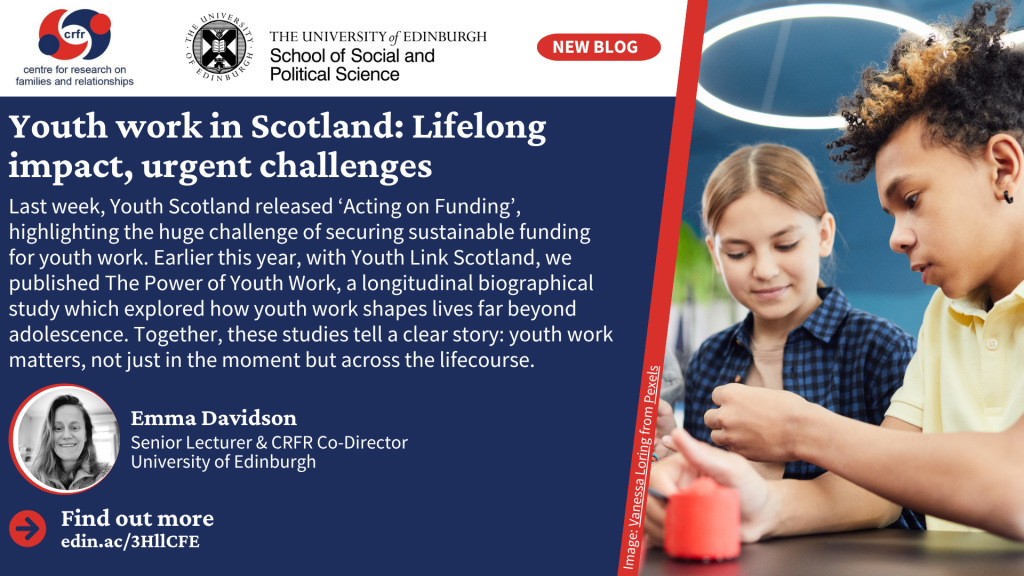Youth work in Scotland: Lifelong impact, urgent challenges
by Emma Davidson

Last week, Youth Scotland released Acting on Funding, an important piece of research that highlights a reality all too familiar for those working with young people: the huge challenge of securing sustainable funding for youth work. Their findings are stark – 79% of youth groups surveyed ranked funding as the main challenge facing their organisation, and 97% said it limited their ability to deliver more of their work. Behind these figures are real concerns about the spaces, relationships and opportunities that young people risk losing.
Earlier this year with Youth Link Scotland, we published The Power of Youth Work, a longitudinal biographical study which explored how youth work shapes lives far beyond adolescence. Our research followed the journeys of young people into adulthood, showing how youth work creates places of belonging, safety and growth. Participants spoke powerfully about how youth workers gave them someone to trust, somewhere to go and something to believe in, often when other services or institutions had let them down.
Together, these studies tell a clear story: youth work matters, not just in the moment but across the lifecourse. It supports young people to navigate transitions, build confidence and develop skills that stay with them for life. It builds social ties within communities, creates routes to further learning and employment, and opens up opportunities that can change life chances.
Yet the vital contribution of youth work is under threat, all in a time when demand is growing. Acting on Funding makes plain how fragile the sector’s financial foundations are. Too many youth workers face short-term contracts, shrinking budgets and uncertainty about whether their projects will survive the year. Too many communities have lost youth centres, trusted spaces that once acted as a hub for young people to meet, learn and grow.
If we want to see the positive impacts of youth work continue through people’s lives, we need action now. This means properly resourced youth work that is recognised as an essential part of Scotland’s social fabric. It means valuing youth workers for the skilled professionals they are, investing in their training and job security. And it means safeguarding physical spaces in local communities where youth work can thrive, not just today but for generations to come.
As researchers, practitioners and policymakers, we know what good youth work can do. We also know what is at risk if we fail to act. It is time for a renewed commitment to funding youth work fairly and sustainably, so that every young person has the chance to benefit from its transformative power throughout their lives.
You can read Youth Scotland’s Acting on Funding report here and our Power of Youth Work study here.
ABOUT THE AUTHOR
Emma Davidson is Senior Lecturer in Social Policy and Qualitative Research Methods and Co-Director of CRFR at the University of Edinburgh.
ABOUT THE CRFR BLOG
This is the official blog of the Centre for Research on Families and Relationships.
To keep up to date on all the latest posts and related events from CRFR, please subscribe via the button below.
This Blog is moderated by a CRFR representative who reserves the right to exercise editorial control over posted content.
Please note: the views expressed in a post are those of the author(s) and do not necessarily reflect those of CRFR.
